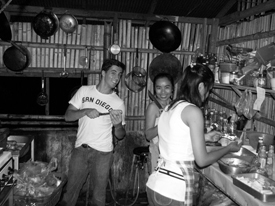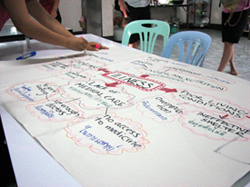Rutgers student travels to Thailand and returns shining a light on human trafficking

Rutgers senior Daniel Christopher considers himself an “average student.” But average students don’t typically enter brothels in Thailand, looking to elucidate one of the world’s most pressing humanitarian problems: global human trafficking.
Click here to watch the 16-minute Ta-To demo film.
“I am somebody who is perceptive to the issues and just cares. I don’t think of myself as special. I consider myself to be lucky and aware, and things just happened at the right place at the right time,” Christopher said.
Christopher found Global PACT (Partnerships for Activism and Cross-Cultural Training) at the right time. He joined the Rutgers organization in his junior year and embarked with 25 other students on a trip to Thailand, where he learned about the complexities of human trafficking.
His organization, Ta-To ("wide eyes" in Thai), was one of two organizations to receive continued funding from Global PACT last year. Christopher plans to grow the organization by empowering young people in Southeast Asia to use technology to tell stories of human trafficking and other challenges specific to the region.

“It’s the perfect example of what we’re hoping for from a project,” said D. Michael Shafer, professor of political science at the School of Arts and Sciences in New Brunswick and founder of Global PACT. “It targets a critically important problem, it offers an immediately implementable solution, and it has a high probability of having an impact.”
In developing countries, the trafficking trade steals away an individual’s basic human rights. Traffickers use coercion, abduction, fraud, and economic leverage to steal people and sell them into forced labor, prostitution, unwanted marriage, and other forms of servitude.
According to the International Labor Organization at the United Nations, there are an estimated 12.3 million people in forced labor, bonded labor, and sexual servitude at any given time. Annually, approximately 800,000 people are trafficked across national borders; 80 percent of them are women and girls, and up to 50 percent are minors, according to U.S. government-sponsored research completed in 2006.
Global PACT began in the summer of 2002 in Mongolia as a project involving the Rutgers University Citizenship and Service Education (CASE) program, several nongovernmental organizations (NGOs), and other institutes and nonprofit groups. Global PACT is now part of the Center for Global Security and Democracy at Rutgers–New Brunswick. The organization has taken its training program to Kosovo, Croatia, and South Africa, as well as Boston and several New Jersey locations.
Global PACT puts students from different countries together in classrooms and trains them in identifying and solving issues that affect their communities and the rest of the world. The students then work together on specific aspects of those problems, learning about one another’s culture in the process.
“What distinguishes Global PACT is that it is entirely experiential,” Shafer said. “There are no articles, no textbooks, no theory. The entire pedagogy is one of discovery.”
Christopher made friends with Greg Mills, a Northeastern University student from Christopher’s home state of California. The pair eventually became filmmaking partners. Christopher initially wanted to work on global environmental problems, but his outlook changed once he met his project partners, three female students from Southeast Asia.
“The girls were from three different countries, so they didn’t have the ability to communicate with each other very easily,” Christopher said. “One was from Laos, one was from Burma, and one was from Thailand. We all got along great.”
At the young women’s urging, Christopher eventually decided to shift his focus and tell the stories of people who had been trafficked.
In a 16-minute demo film, Christopher and Mills say the young women provided an entry into communities in Thailand and Burma that the two young men could never have penetrated. In turn, Mills and Christopher supplied a mini-camera. Christopher picked up Thai during the trip and now speaks with a basic level of proficiency. The pair plans to travel back to Thailand several times over the next year and is projecting a release of a full scale film in early 2009.
The team encountered people and issues that lent greater depth to the trafficking issue. Christopher now seeks to portray people not as “victims” but as rational agents who deal with ethical quandaries mostly unimaginable to people living in Western countries.
“I met a woman who was contemplating selling her child because her husband had a kidney disorder and they needed money for surgery. We were observing the roles of duty and family: Should the daughter have a choice? She is 15, should she say, ‘I want to go to Bangkok to help my dad raise money?’” Christopher said. “It is pivotal to make people aware of these situations because we want to portray the women as rational agents in making the documentary. They have to make very difficult ethical decisions.”
Shafer said that Christopher’s identification of these complicated issues brought a new perspective to the study of trafficking. “I don’t know anybody who has actually gone out and asked mothers and fathers why they sent their daughters and, at the same time, asked others why they did not send their daughters. This is a complicated story, and this is one of the things that really set Daniel apart for me.”
Christopher and Mills want to secure enough funding to provide dozens of Thai youth with video cameras so that they can record their own stories and document local cultural events to preserve the cultures of the various hill tribes. Many elders, Christopher said, are concerned their children are too fascinated with new technology and video games to bother learning traditional Thai dances and other customs.
The teens would not be encouraged to place themselves in dangerous situations – something Christopher tried to avoid but nevertheless found himself in. He crossed the Thai border into Burma, a government ruled by a brutal military junta that doesn’t take kindly to foreigners with video cameras, to interview a family. On another occasion, he and Mills went into a Thai brothel disguised as a karaoke bar to interview a sex worker about the trafficking issue.
“It wasn’t dangerous,” Christopher said, “but it could have been if we had been more risky.”
Keeping in line with Global PACT’s cross-cultural emphasis, Christopher hopes his work will transform the minds of both Americans and Asians.
“The big thing is to change Americans’ perceptions but also to raise awareness among Thais and others that they do have other alternatives. They don’t have to sell their children into some random maid job that they don’t have details about,” Christopher said. “Awareness is the first step to prevention.”